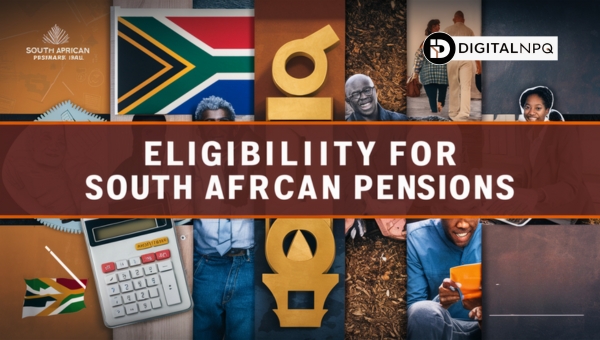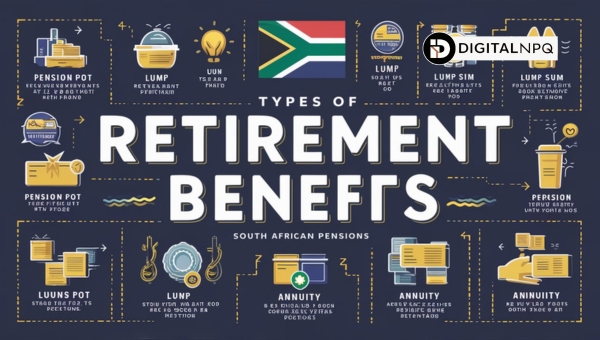Retirement Benefits in South Africa: Your Best Guide

Understanding retirement benefits in South Africa can significantly impact your financial future. This article dives deep into the South African pension system, covering eligibility criteria, types of retirement benefits, tax implications, and the application process.
Whether you’re a resident or an expat, we’ll guide you through the complexities to help you make informed decisions. Ready to secure your retirement? Let’s get started!
An In-Depth Look at The South African Pension System
The South African pension system is designed to provide financial security for retirees through various means. State pensions, also known as the Old Age Grant, are available to citizens over the age of 60 who meet specific income and residency requirements.

For those working in the formal sector, occupational retirement plans are often provided by employers. These plans require contributions from both the employee and the employer, with benefits based on the accumulated contributions and investment returns.
Additionally, private savings options like retirement annuities offer a flexible way for individuals to bolster their retirement funds independently.
Survivor’s pensions are also available for the dependents of deceased members, providing either a monthly pension or a lump sum payment, depending on the service length of the deceased. Understanding the nuances of each type of retirement benefit is crucial for planning a secure financial future in South Africa.
Eligibility for South African Pensions
Understanding eligibility for South African pensions is vital for those planning their retirement. We’ll explore the age and requirements for pensions and delve into the specifics of expatriates.

Pension Age and Requirements
To qualify for a pension in South Africa, you need to meet certain criteria:
- Normal retirement age: Typically 60 for government employees and 65 for most private sector employees.
- Minimum service period: Often a minimum of 10 years for certain benefits.
- Income and residency requirements: Specific to certain pension types like the Old Age Grant.
Pensions for Expats
Expatriates can also qualify for South African pensions, but there are unique considerations:
- Eligibility: Must contribute to a South African retirement fund for a minimum period.
- Fund rules: Adhere to specific fund regulations, which may vary.
- Tax implications: Understanding the tax impact of drawing pensions in both South Africa and the home country is crucial.
Also Read: South African Revenue Service: History, Issues, and Opportunity
Types of Retirement Benefits
Understanding the different types of retirement benefits in South Africa is essential for planning your future. This section breaks down state pensions, occupational retirement plans, and survivor’s pensions to give you a clearer picture of what’s available.

State Pensions
State pensions in South Africa are primarily aimed at providing financial support to older citizens who meet specific criteria.
Here’s what you need to know:
- Old Age Grant: This is available to South African citizens who are 60 years or older.
- Eligibility: Applicants must pass a means test, which considers income and assets.
- Residency: Must be a permanent resident in South Africa.
Occupational Retirement Plans
Occupational retirement plans are offered by employers and are designed to supplement state pensions. These plans have several key features:
- Defined Contribution Plans: Both the employee and employer contribute to the fund.
- Benefits: The amount received upon retirement depends on the accumulated contributions and investment performance.
- Flexibility: Often includes options to transfer funds if changing jobs.
Survivor’s Pensions
Survivor’s pensions provide financial support to the family members of a deceased pension fund member.
Key points include:
- Eligibility: Typically, the spouse or children of the deceased.
- Benefits: Can include a monthly pension or a one-time lump sum payment.
- Requirements: The deceased must have been a contributing member of the pension fund.
Understanding these retirement benefits will allow you to make informed decisions about your financial future in South Africa.
Tax Treatment of Retirement Benefits
Understanding the tax treatment of retirement benefits in South Africa is crucial for effective financial planning. This section delves into the nuances of how lump sum benefits and annuity income are taxed, ensuring you know what to expect when the time comes.
Lump Sum Benefits
When you receive a lump sum from your retirement savings, it is subject to specific tax regulations:
- Tax-free Threshold: The first R550,000 of the lump sum is tax-free.
- Tax Rates Beyond Threshold:
- R550,001 to R770,000: Taxed at 18%
- R770,001 to R1,155,000: Taxed at 27%
- Above R1,155,000: Taxed at 36%
These rates apply to the cumulative total of all lump sums received from retirement funds over a lifetime.
Annuity Income
Annuity income, which is drawn periodically from your retirement savings, is treated differently:
- Taxable Income: Annuity payments are taxed as regular income.
- Marginal Tax Rate: The income is taxed at your applicable marginal tax rate.
- Pay-As-You-Earn (PAYE): Tax is often deducted by the annuity provider before payments are made to you.
This ensures that your retirement income is taxed in a manner similar to employment income.
Applying for a Pension in South Africa
Getting your pension in South Africa involves several steps and necessary documents. Here’s a detailed guide to ensure a smooth application process:
Step-by-Step Guide
- Determine Eligibility
- Check your age: Ensure you meet the minimum age requirement for the pension type you’re applying for.
- Service period: Verify if you have the minimum years of service required.
- Gather Necessary Documentation
- Identification: Certified copy of your ID or passport.
- Proof of Residence: Recent utility bill or lease agreement.
- Bank Details: Bank statements or a letter from your bank confirming your account details.
- Employment Records: Service certificates or payslips to confirm your work history.
- Tax Number: Proof of your tax number from the South African Revenue Service (SARS).
- Complete Application Forms
- Obtain the relevant application forms from the Department of Social Development or your pension fund provider.
- Fill out each form accurately, providing all requested information.
- Submit Application
- Submit your completed forms and supporting documents to the relevant office or online portal.
- Ensure you get a receipt or confirmation of submission.
- Await Approval
- Processing Time: Be prepared to wait several weeks for your application to be processed.
- Follow-up: You may need to provide additional information or clarify details during this period.
By following these steps, you can navigate the pension application process in South Africa with ease.
Supplementary Pension Options
When planning for retirement, it’s important to look beyond state-sponsored or employer-funded plans. In South Africa, there are several supplementary pension options that can help you achieve a secure financial future. These options offer flexibility and can be tailored to meet individual needs.
Private Retirement Annuities
Private retirement annuities are a popular choice for those who want to supplement their primary pension.
- Flexibility: You can choose how much to contribute and how often.
- Tax Benefits: Contributions are tax-deductible, reducing your taxable income.
- Investment Choices: A range of investment options allows for personalized financial strategies.
Tax-Free Savings Accounts (TFSAs)
TFSAs are another excellent way to save for retirement.
- Tax-Free Growth: Any interest, dividends, or capital gains earned are not subject to tax.
- Annual Contribution Limits: There is a cap on how much you can contribute each year, so it’s important to plan accordingly.
- Accessibility: Funds can be withdrawn at any time without penalty, offering liquidity.
Unit Trusts
Unit trusts are investment funds that pool money from multiple investors to invest in a diverse portfolio.
- Diversification: Reduces risk by spreading investments across various assets.
- Professional Management: Managed by financial experts, making it easier for individuals to invest.
- Accessibility: Can be bought and sold at any time, providing flexibility.
Endowment Policies
Endowment policies are life insurance products that also offer investment benefits.
- Guaranteed Payout: Provides a lump sum after a specific period, which can be used for retirement.
- Tax Benefits: Premiums may offer tax advantages depending on individual circumstances.
- Life Cover: Includes a life insurance component, offering additional security for your family.
Preservation Funds
Preservation funds are designed for those who leave their job and want to keep their retirement savings intact.
- Transfer of Funds: Allows you to transfer funds from your employer’s pension or provident fund without tax penalties.
- Flexibility: You can withdraw part of the money before retirement under certain conditions.
- Investment Options: Offers a variety of investment choices to grow your savings.
These supplementary pension options provide various ways to enhance your retirement savings. By exploring these additional avenues, you can create a more robust and secure financial future.
Also Read: $145M Kia Theft Lawsuit: How to Join and Claim Your Share?
Challenges and Opportunities in the Pension System
The South African pension system faces several challenges but also presents opportunities for improvement and reform. Let’s delve into some of these aspects:
Current Challenges
- Low Coverage Rates: Many workers in the informal sector do not have access to pension plans, resulting in limited retirement savings.
- Sustainability Issues: The long-term sustainability of the pension system is under scrutiny due to increasing life expectancy and the economic burden on the state.
- Financial Literacy: There is a lack of financial literacy among many South Africans, which impacts their ability to make informed decisions about retirement savings.
- Administrative Complexity: The process of applying for and managing pensions can be cumbersome and confusing for many people.
Potential Reforms
- Enhanced Coverage: Expanding pension coverage to include informal sector workers can ensure a more inclusive system.
- Sustainability Measures: Implementing policies that promote the sustainability of pension funds, such as adjusting contribution rates and retirement age, can help maintain the system’s viability.
- Education Programs: Introducing comprehensive financial literacy programs can empower individuals to better manage their retirement savings.
- Streamlined Processes: Simplifying administrative procedures can make it easier for people to navigate the pension system.
Opportunities
- Private Sector Involvement: Encouraging private sector participation can lead to more innovative and flexible pension products.
- Technology Integration: Utilizing technology can improve the efficiency and accessibility of pension services, making it easier for people to manage their accounts.
- Policy Revisions: Regularly revisiting and updating pension policies can ensure that they remain relevant and effective in addressing current and future challenges.
- Public Awareness Campaigns: Raising awareness about the importance of retirement planning can motivate more people to participate in pension schemes.
It’s important to note that addressing these challenges and seizing these opportunities requires a collaborative effort from the government, private sector, and individuals. By working together, South Africa can build a more robust and inclusive pension system for the future.
FAQs
How much money do you need to live comfortably in South Africa?
The amount needed to live comfortably in South Africa varies based on lifestyle and location. On average, a monthly income of around R20,000 to R30,000 is considered sufficient for a moderate lifestyle.
How many South Africans can afford to retire?
Many South Africans struggle to save enough for retirement. Studies suggest that only about 6% to 10% of South Africans are adequately prepared for retirement, highlighting the need for better financial planning.
Is South Africa good for retirement?
South Africa offers a favorable climate, diverse landscapes, and affordable living costs, making it an attractive retirement destination. However, potential retirees should consider factors like healthcare access and personal safety.
Conclusion
Understanding retirement benefits in South Africa is vital for securing a stable financial future. From state pensions to occupational plans and private savings, there are various options to consider. Ensuring eligibility and being aware of tax implications are crucial steps in navigating the pension system effectively.
Whether you’re a resident or an expatriate, having a comprehensive understanding of these benefits can significantly impact your retirement planning. Thank you for reading! For more insightful and informative blogs, be sure to check out the other articles on our site.
